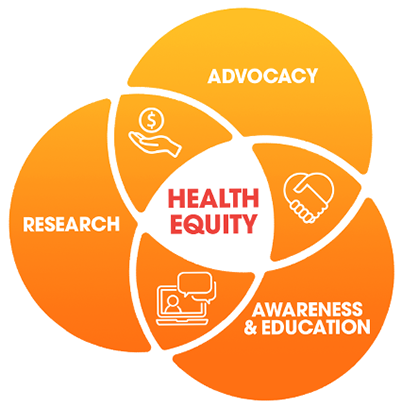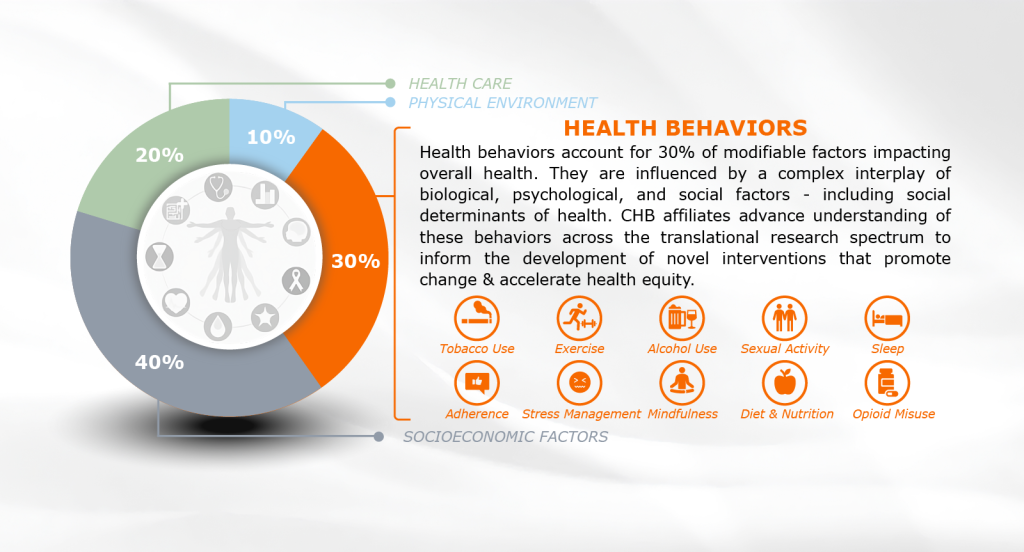Center for Health Behavior Research & Innovation (CHB) studies span the translational spectrum of health behavior research, from controlled human laboratory trials to the development and testing of novel intervention and assessment modalities. With an emphasis on the complexities of individual and group health behaviors, this work examines biopsychosocial correlates, predictors, and mechanisms of health behavior change across various life stages. These advances are then systematically disseminated, implemented, and evaluated in collaboration with community stakeholders, healthcare partners, and public health experts to achieve significant impact in real-world settings.
Vision and Mission
To lead in the conduct and dissemination of innovative translational health behavior research, education, and training. We aim to support human thriving, reduce disparities, and accelerate health equity by:
- Promoting Interdisciplinary Collaboration: Cultivating cross-university partnerships among faculty, students, and community partners from diverse fields—including psychology, medicine, public health, social work, sociology, epidemiology, and policy—to address complex health behavior challenges.
- Conducting Rigorous Research: Undertaking high-quality research and translating empirical insights to iteratively inform the development of innovative and culturally relevant assessment, prevention, and intervention strategies.
- Leveraging Advanced Approaches: Utilizing personalized methods, novel techniques, and advanced technologies to overcome treatment barriers, empower individuals in diverse communities, and enhance precision in behavioral health care.
- Enhancing Health Literacy: Decreasing stigma and improving understanding by educating providers and sharing emergent research findings with the community in an engaging and empowering manner.
- Educating Future Leaders: Training and diversifying the next generation of health behavior researchers and clinicians through unique experiential and inquiry-based learning opportunities.
Foundational Objectives
Research and Collaboration
At CHB, we cultivate cross-university, interdisciplinary research collaborations among faculty, students, and community partners from diverse fields—including psychology, medicine, public health, social work, sociology, epidemiology, and policy. By partnering with local and national organizations and healthcare systems, we increase opportunities for faculty and students to secure external funding and conduct high-impact health behavior research.
Health Equity
Driven by a steadfast commitment to health equity—ensuring everyone has a fair and just opportunity to attain their highest level of health—we unify and build upon the interests and expertise of CHB affiliates who investigate and address psychosocial determinants that contribute to health disparities.

Education and Training
We help train the next generation of health behavior researchers and clinicians by providing integrated opportunities for graduate and undergraduate students. Through experiential and inquiry-based learning, along with health behavior-oriented educational programs, we prepare future researchers and healthcare professionals.
Alignment With University and College Strategic Plans
The mission and vision of CHB embodies the integration of research innovation with societal impact, aligning closely with the strategic objectives of Syracuse University and the College of Arts & Sciences.
Syracuse University Academic Strategic Plan
Through focused efforts in cross-disciplinary collaborative health behavior research, CHB directly supports Syracuse University’s Areas of Distinctive and Aspirational Excellence, including Human Thriving, Emerging Technologies, Experiential Inquiry, and Engaged Citizenship. The work of CHB affiliates related to the development and application of novel intervention and assessment methods leverages emerging technologies to advance human thriving, while also affording a range of student-oriented experiential learning and engagement opportunities. Center initiatives aimed at engaging communities in meaningful research and education endeavors further reflect the University’s commitment to Engaged Citizenship. CHB activities are also in line with the University’s Strategic Programmatic and Operational Commitments to foster and support research in areas of distinctive excellence, break down barriers and bridge silos, and engage communities. CHB aims to connect faculty, students, and community partners across various disciplines, effectively breaking down traditional academic barriers and fostering community engagement both locally and beyond.
College of Arts & Sciences Academic Strategic Plan
Corresponding with the Academic Strategic Plan of the College of Arts & Sciences, as articulated in “Advancing the Liberal Arts for a Better Tomorrow,” CHB directly contributes to the signature area of Translational and Equitable Health and Well-Being. The work of CHB affiliates, which spans the translational spectrum of health behavior research with a focus on accelerating health equity and eliminating health disparities, complements the College’s efforts towards elevating impactful health behavior research and education. As noted in the subsection entitled Distinguished Work & Recent Activities, the newly established CHB will cultivate innovative health behavior research, student training, and community outreach through collaborations across multiple A&S disciplines and related University entities. Through strategic partnerships, including collaboration with the D’Aniello Institute for Veterans and Military Families, CHB aims to enhance distinctive excellence in high-impact research, teaching, and public engagement, thereby supporting the College’s broader mission to cultivate just and sustainable communities.
Key Terms
Health behavior encompasses the actions and decisions that impact an individual’s physical and mental health. This includes activities like physical exercise, eating well, avoiding harmful habits like smoking and excessive drinking, and adopting preventive measures such as vaccinations. By identifying patterns and determinants of these behaviors, researchers can develop customized interventions to encourage healthier living, lower chronic disease risk, and improve life quality across diverse populations.

Behavioral health is closely connected to health behavior, focusing on the emotional, psychological, and social well-being of individuals. It encompasses the study, prevention, diagnosis, and treatment of mental and substance-related disorders, emphasizing the equal importance of mental and physical health in achieving overall well-being.
Biobehavioral interplay highlights that health outcomes and disease susceptibility are influenced by a combination of biological processes and interaction with health behaviors and psychosocial factors such as cognition, stress, health beliefs and attitudes, and social support, among others.
Psychosocial determinants of health refer to psychological and social factors that influence health and well-being at the individual level. These can include attributes (e.g., coping skills, emotional factors, mental resilience, self-esteem, perceived control, and stress management), experiences of stigma and discrimination, social factors (e.g., interpersonal relationships, social support systems, and community networks), and psychological impacts of socio-economic status, as well as the influence of cultural beliefs and expectations. Psychosocial determinants complement the broader social determinants of health, which encompass environmental and societal conditions such as economic stability, living conditions, and access to healthcare, affecting groups and communities at large.
Innovation in the context of health behavior research involves the development and application of novel concepts, methods, and technologies to promote health and prevent disease. This includes identifying and developing innovative solutions to complex health challenges, such as creating more effective and accessible assessments/interventions and leveraging emerging methods and digital tools for monitoring and intervening upon interplay between cognition, behavior, and health.
Team science is an interdisciplinary approach that brings together experts and stakeholders from various fields to address complex scientific questions. By combining knowledge, skills, and perspectives across scientific boundaries, team science facilitates a more comprehensive understanding of health behavior and enhances innovation in research, leading to more effective solutions and the translation of emerging research findings into effective policies and practices.
The intersection of health behavior and population health underscores the pivotal role of both individual and group behaviors in shaping community health outcomes. By integrating insights from health behavior research into the framework of population health—and vice versa—we can more effectively promote wellness, prevent disease, and manage chronic conditions, thereby improving overall community health. This collaborative work can further inform policy making, fostering the development of environments that better support healthy choices, access to care, and human thriving.
